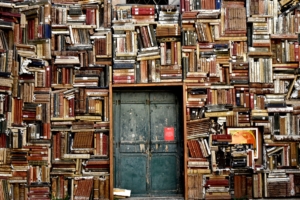
1) Blood and Thunder: The Epic Story of Kit Carson and the Conquest of the American West by Hampton Sides. I was in a bookstore in lovely downtown Santa Fe, New Mexico and the store owner saw me looking at this book. He said, “That will be one of the best books you’ll ever read.” I bought it immediately and it turns out he was right. It’s not often that a book is so good that every single paragraph is filled with fascinating information. It’s the true story of one of the most adventurous men in American history. Kit Carson was a soldier, a hunter, and an expert at understanding and gaining the trust of Native American tribes and he seemed to have nine lives–escaping all kinds of imagineable and unimagineable dangers. It is 1846 and the West is on the brink of being conquered by the United States. The gentle, mild-mannered Carson is tough than Rambo and has more adventures than Indiana Jones. Native Americans are making their last stands, Mexican people and tribes still occupy the Western half of what would become the western United States, and nature is starting to take a beating as humans wipe out buffalo and cause environmental destruction. Carson’s life is constantly exciting, but even more interesting is this extremely vivid glimpse into what life was like in the Old West and what was lost as territory was gained.
2) In Black and White: The Life of Sammy Davis Jr. by Wil Haygood. If you are old enough, like me, you remember enjoying the music, acting, and comedy of Sammy Davis Jr. and the rest of Frank Sinatra’s Rat Pack. But it’s only those who really grew up watching Sammy from childhood that understood how groundbreaking and talented he was. Beginning in the era of vaudeville as vaudeville is dying and is being replaced by the movies, this book not only covers Davis’ long career as an entertainer (he was a child star born in 1925), but also the changes in the entertainment industry and the racism that provided obstacles throughout his whole life. Before Michael Jackson, there was Sammy who seemed to be able to do everything from tap dance, play drums, do impressions, and bring people to tears with his singing. A natural comic, the tiny man with a glass eye (he had a horrific car accident and lost his eye as he was becoming a household name in America) found ways to be succesful and relevant no matter what obstacle life threw at him. Why Me, a biography (based on his autobiography Yes I Can), was one of the best books I read during college. I figured a biography about Sammy with many voices speaking in would be wonderful, and it was. Great for those that were fans of his or love to read about old showbiz.
3) Mao: The Unkown Story by Jung Chang. The story of Mao is well-known and written about, so what can Chinese scholar Jung Chang add? She adds example after example of people NOT being on-board with Mao’s reckless and poorly-thoughout out plans. It’s something we never talked about in graduate school studying modern Chinese history. From his time in Yan’an after the mostly mythical “Long March” to his deathbed in 1976, Chang talks about the many people who tried to stop Mao–and the price they paid for it. The elegant and usually celebrated Zhou Enlai comes off as a man who always knew Mao was a disaster but could never muster up the courage to challenge him, no matter how much humiliation Mao would dish out to him. It’s an angle not written about much and Chang does a great job re-telling the well-known story. Wild Swans remains her masterpiece, however.
4) Count Down: How Our Modern World Is Threatening Sperm Counts Altering Male and Female Reproductive Development, and Imperiling the Future of the Human Race by Shanna H. Swan. Any pediatrician will tell you, children are going through puberty at a much younger age. It is in fact, shocking how early some kids are developing. There are also higher rates of miscarriages (women are only 33% as fertile as their grandmothers), extremely low testosterone levels for men–even young men, estrogen issues for women, and spermbanks that can barely use the material they are given because of deformities. In addition to all of this, genitals themselves are changing and all of this is being observed in the animal kingdom as well at the same time. Initially a skeptic for over 15 years, Swan and her researchers at Stanford found consistent, solid evidence that forever chemicals (endocrine disrupters like plastics, chemicals in food, and drugs that never leave our system) are permanently altering our human bodies. In other words, the chemicals on our farm fields, in our facial products, in our soft-drinks and even in our vegetables are doing great damage to fetuses in the womb. So much so, that it leads to more cases of gential deformity and gender dysphoria. The United States is particularly bad at allowing blatantly illegal chemicals to be unregulated. Over 500 poisons are legally exempt from being taken out of our foods and products in the United States. Then there are the many experimental drugs, anti-depressants, and other medicines that are regularly taken. For those afraid of the Covid vaccine, your average cheeseburger, french fries and the vegetables in your salad probably has more harmful chemicals than a rapidly-made vaccine–chemicals that never leave the body. Swan’s book is very important and there’s not enough discussion about what LEGAL and highly dangerous chemicals are in our food and other products that go on our body. Society taking this book seriously, however, would damage the profit-margins of a multitude of companies and corporations and would force more sensitive nuanced discussions about sexuality, pregnancies, health care and identity. That’s probably the reason the subject and the book do not get enough attention.
5) Genesis for Normal People: A Guide to the Most Controversial, Misunderstood, and Abused Book in the Bible by Peter Enns and Jared Byas. Considering it’s probably the most well-known book in the Bible, it’s remarkable how bad many Christians are at reading Genesis. That is a tragedy, because Genesis is a book that can teach you to read the Bible very correctly or highly inaccurately. There are many good books on Genesis, but this one is the most simple, easy-to-understand guide to getting a handle on what is-otherwise–a very, very strange, but crucial book. Aside from its religious meaning, Genesis has had a huge impact on Western Civilization’s view of humanity in general. Nothing in this sensitively written book should be controversial if one takes seriously Near Eastern literature on its own terms, but sadly even a book this simple and non-threatening would probably be too much for many.
6) Never by Ken Follet. After spending years writing exciting trilogies spanning the World Wars and Medieval times, Follet begins a trilogy in the current era. A U.S. President, CIA officers, and African migrants are just some of the people trying to avert catastrophe as they take on China and Islamic jihadists who are setting up a nuclear war scenario. Part 1 of 3.
7) Roadmap to Hell: Sex, Drugs, and Guns on the Mafia Coast by Barbie Latza Nadeau. A depressing but highly-informative look at how the various Italian mafias in the south of Italy smuggle weapons, drugs, human migrants, and women for sexual slavery purposes. It’s bleak with some unforgettably awful stories. But one learns how efficient these groups are, how lucrative drugs are and how inhuman are the conditions that migrants (particulalry from Africa) must deal with as their own towns in Africa get destroyed. Furthermore, it becomes easier to see how poverty-traps are created and escape is virtually impossible. It’s a side of Italy and Europe that most don’t see (and which is present all over the world). For those of us doing charitable work in these communities, this is a good introduction into how these global networks function.
